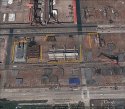Found at
As expected the interruption of trading in CSIC shares since May was connected with the production of aircraft carriers, although this article still can't say which yard will build the next one.
Notice the price expected for each carrier fleet, $20b, nearly twice the value of the shipbuilding concern.
This financial change will likely also spur the export of naval vessels.
UPDATE 2-State-backed China Shipbuilding to raise $1.4 bln for naval buildup
Wed Sep 11, 2013 10:48am IST
(Adds maritime analyst quote, details)
By Yimou Lee and Michael Martina
(Reuters) - State-backed China Shipbuilding Industry plans to raise up to $1.4 billion through a private share sale to buy assets used for building warships, the first time Beijing is tapping the capital market to fund its military expansion.
The move comes as China creates its own military-industrial complex, with the private sector seen taking a key role, as the country gains a new sense of military assertiveness and deals with a growing budget to develop modern equipment including aircraft carriers and drones.
China, whose military spending is now second only to the United States, has unveiled a double-digit rise in its 2013 military budget, with spending on the People's Liberation Army set to rise 10.7 percent to 740.6 billion yuan ($119 billion).
"The thinking of those high-ranking officials is changing. Military asset securitization, or tapping capital markets for military expansion, will be the future trend and the funding scale will also become bigger and bigger," said Wang Hexu, a Shanghai-based analyst at Hwabao Securities.
"Now aviation and weaponry may also be the next sectors for asset securitization," he said.
China Shipbuilding Industry Co Ltd (CSIC) said it plans to raise as much as 8.48 billion yuan ($1.4 billion) by selling up to 2.2 billion shares to as many as 10 selected investors. The investors include two sibling companies, Wuchang Shipbuilding and Dalian Shipbuilding, which are key builders of Chinese warships.
The company, a key supplier to the People's Liberation Army, said it was the first time China was going to the capital market to fund the buildup of its core military.
"The deal will expand the financing channels for China's military defense," China Shipbuilding said in a statement posted on the Shanghai Stock Exchange's website. "It would also herald an overall securitization of China's military assets."
NEW CARRIERS
Beijing last year issued new guidelines aimed at encouraging private investment in a defence sector traditionally sheltered from competition and public scrutiny.
Such investment would bode well for Chinese military-focused shipbuilders compared with commercial shipbuilders like Rongsheng Heavy Industries Group, which fell to a first-half loss and has requested financial help from the government.
China is expected to build one or more aircraft carriers over the next five to 10 years, with each carrier fleet costing nearly $20 billion, China Shipbuilding said, citing expert forecasts.
"CSIC has been rumoured to be one of those that's going to either build, or fit out the new domestically manufactured aircraft carrier," said Gary Li, a Beijing-based senior maritime analyst at consulting firm IHS.
"Some of the companies that are going to be the main buyers of the shares are all keen to have a stake in the new carrier project. Everything from batteries to catapults. It's a big task and the Chinese shipbuilding industry is going to need as many stakeholders and investors as it can get."
Shanghai-listed shares of China Shipbuilding, which had been suspended since May pending the announcement of the deal, jumped more than 10 percent on Wednesday morning. The company has a market value of $10.8 billion.
Military-related products account for 8.3 percent of China Shipbuilding's income, according to Hwabao Securities.
China currently has one aircraft carrier, the Liaoning, which was refitted from a Russian-made model. Considered by military experts to be decades behind U.S. technology, it was originally intended to serve as a floating casino but was turned to military use in the run-up to a power transition in 2012.
China has been at odds with some of its Southeast Asian neighbours over conflicting claims to strings of islets in the resource-rich South China Sea and Beijing now has the firepower to challenge these rivals.
($1 = 6.1200 Chinese yuan)
(Additional reporting by Samuel Shen and Kazunori Takada in SHANGHAI; Writing by Anne Marie Roantree; Editing by Chris Gallagher)
As expected the interruption of trading in CSIC shares since May was connected with the production of aircraft carriers, although this article still can't say which yard will build the next one.
Notice the price expected for each carrier fleet, $20b, nearly twice the value of the shipbuilding concern.
This financial change will likely also spur the export of naval vessels.
Last edited:


